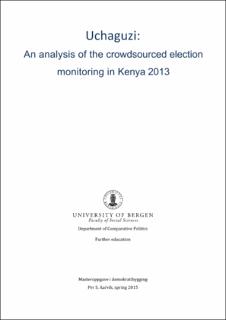Uchaguzi: An analysis of the crowdsourced election monitoring in Kenya 2013
Master thesis
Permanent lenke
https://hdl.handle.net/1956/10904Utgivelsesdato
2015-06-01Metadata
Vis full innførselSamlinger
Sammendrag
During the 2013 general elections in Kenya the crowdsourced election monitoring project Uchaguzi ran in parallel with ordinary domestic and international election observations. Such monitoring projects have been performed in several countries, and research on the methods and effects of crowdsourced election monitoring is increasing. In particular, scholars are focusing on the political significance of such projects, whether value is generated for citizen participation in democratization and political engagement. Very few studies have looked at the actual content of the reports generated through such projects and compared the findings of the crowd with official election reports. This study investigate the content of 2300 sms reports in the Uchaguzi dataset, and compare the story revealed in these reports with the conclusions in the election observation report from a recognized institution, the Carter Center. The report from the domestic monitoring group ELOG is also used for reference. The aim is to evaluate the relevance and reliability of the crowdsourced reports. The findings show that the Uchaguzi reports indeed presented a relevant picture of the events on election day. The crowd focus on how smoothly they were able to perform the voting, on security and injustice like bribery or intimidation. They are far less occupied with electoral formalities and processes. Monitoring in near realtime enables the platform to be an alert central for urgent reports. Logging time and location for each message generates timelines and geographical overview that traditional reports does not. The findings suggest that crowdsourced election monitoring project can benefit from a further development of the questions asked to the crowd. Today these are to a large extent inherited from traditional observation methodologies.
